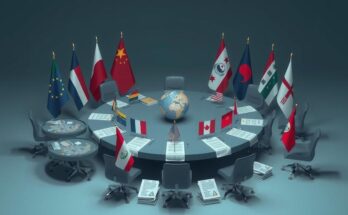Egypt and Ethiopia are engaged in an arms race within Somalia, complicating efforts against terrorism. Egypt has begun supplying arms to Somalia, which Ethiopia perceives as a threat. Both nations are trading accusations regarding violations of Somalia’s sovereignty. Somalia has sought to strengthen its military alliances, especially in light of recent contentious military agreements involving Ethiopia and Somaliland.
The ongoing tensions between Egypt and Ethiopia over access to the Nile River have escalated into an arms race within Somalia, potentially undermining joint efforts to combat terrorism in the region. Somalia has asserted its right to control external military assistance, which has led to Ethiopia viewing Egypt’s increasing military support for Somalia as a direct challenge to its security interests, given their historical rivalry. Recently, Egypt has commenced military shipments to Somalia, including heavy artillery, with reports of Egyptian warships escorting these deliveries. Cairo claims that this aid is intended to enhance the capabilities of Somalia’s emerging military, especially as the country combats local insurgent groups such as al-Shabaab. However, such actions are viewed with great concern by Ethiopian officials, who fear that arms supplied to an unstable Somalia could inadvertently strengthen terrorist factions. Amid these developments, Ethiopia has raised alarms regarding external influences allegedly exacerbating the security dynamics in the region, while Somalia has condemned Ethiopia’s own arms shipments to Puntland, a semi-autonomous region. The Somali government perceives these acts as infringements upon its sovereignty and has called for international support to uphold peace in the region. Tensions were further fueled when Ethiopia signed a controversial agreement with Somaliland granting it rights to coastal access for potential military and commercial use. Somalia rejected this agreement, insisting it undermines its territorial integrity and national unity. As a result, Somalia has expressed a desire to exclude Ethiopian troops from future stabilization missions and has instead sought to include Egyptian forces. In addition, Puntland President Said Abdullahi Deni remarked on the political instability in Somalia, implying that success in achieving peace hinges upon resolving underlying political conflicts. The interrelations among these nations remain complex, with Somalia demanding a reinstatement of diplomatic norms contingent on Ethiopia’s revocation of the agreement with Somaliland.
The geopolitical landscape of the Horn of Africa has long been marked by the contentious relationship between Egypt and Ethiopia, primarily centered around Nile River water rights. This rivalry has historically manifested through diplomatic and military posturing, rather than direct confrontation. However, recent developments surrounding Somalia’s internal security situation have added a new layer to this conflict, as Egypt’s military assistance to Somalia has provoked Ethiopia’s concerns regarding regional stability. Following a significant Memorandum of Understanding (MoU) involving Ethiopian access to Somaliland’s coastal resources, Somalia’s perception of Ethiopian intentions has shifted, resulting in diplomatic friction.
The current arms race in Somalia, fueled by deteriorating relations between Egypt and Ethiopia, poses significant risks to regional stability. Egypt’s military support aims to bolster Somalia’s defenses but simultaneously raises apprehensions regarding potential misuse of these weapons by terrorist organizations. The dispute has prompted Somalia to reassess its regional alliances, particularly in light of Ethiopia’s military support to Puntland. Ultimately, achieving lasting peace will require addressing the underlying political tensions that threaten the nation’s unity and sovereignty.
Original Source: nation.africa




